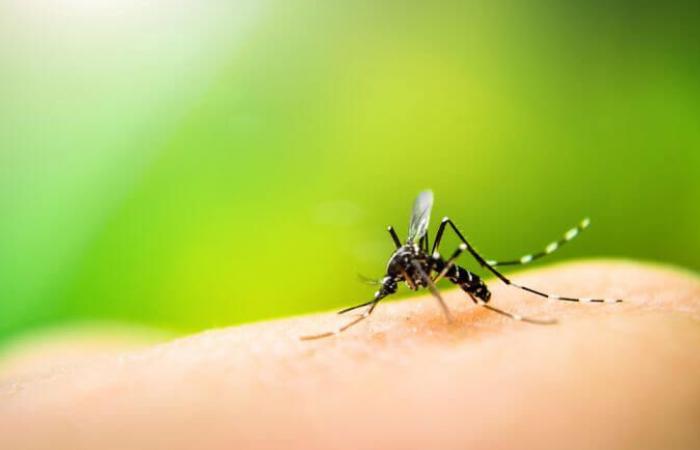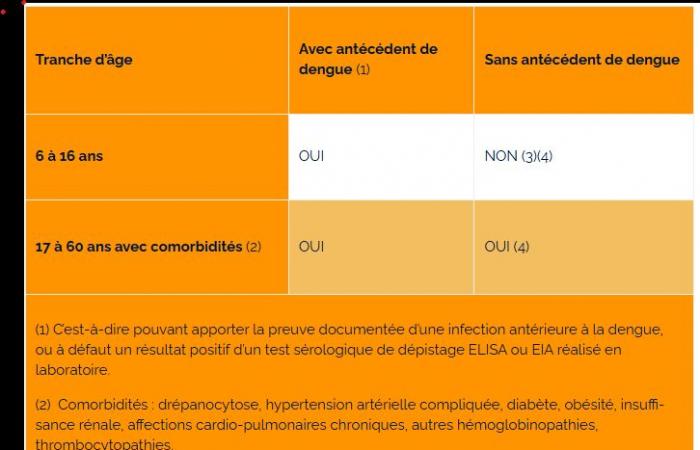Résumé
The High Authority for Health (HAS) has defined the vaccination strategy against dengue with the live attenuated QDENGA vaccine.
It recommends vaccinating the following populations residing in the Antilles, Guyana, Mayotte and Reunion:
- children aged 6 to 16 years with a history of dengue infection;
- adults aged 17 to 60 years old with comorbidities, with or without a history of infection, given the risk of dengue worsening of these comorbidities.
The recommended vaccination schedule includes two doses of QDENGA vaccine spaced 3 months apart. This vaccination must be carried out between two epidemics and at least 6 months after a dengue infection.
The QDENGA vaccine is not marketed in France as of December 19, 2024.
Ssupported by the Directorate General of Health (DGS), the High Authority for Health (HAS) has issued its recommendations for vaccination against dengue with the QDENGA vaccine [1, 2, 3].
Population targeted by dengue vaccination
It recommends vaccination against dengue in the Antilles, Guyana, Mayotte and Reunion in the following populations residing in these territories (cf. HAS table) :
- children and adolescents aged 6 to 16including in sickle cell patients or those with other comorbidities, and having a history of dengue infection. This history must be documented biologically (RT-PCR, NS1 antigenemia, IgM/IgG serology) or clinically (infection diagnosed in the context of a dengue epidemic and recorded in the health record). In the absence of documented proof of previous dengue infection, an ELISA or EIA serological test carried out in the laboratory may be carried out beforehand to determine the serological status of the child/adolescent. However, carrying out systematic pre-vaccination screening is not recommended;
- people aged 17 to 60 with comorbidities (sickle cell disease, complicated arterial hypertension, diabetes, obesity, renal failure, chronic cardiopulmonary conditions, other hemoglobinopathies, thrombocytopathies), with or without a history of dengue fever. Vaccination in this population is justified by the high risk of severe forms of dengue, including in cases of primary dengue due to the risk of decompensation of these comorbidities.
Vaccination of children with sickle cell disease aged 6 to 16 years without a history of dengue can be considered on a case-by-case basis.
To define its recommendations, HAS took into account:
- the epidemiological indicators of dengue over the last 10 years in the overseas departments and regions (DROM) as well as the burden of dengue in different population groups during the last epidemics in these territories. The data shows a majority of deaths in subjects with comorbidities;
- data relating to the QDENGA vaccine in terms of efficacy, immunogenicity, safety and tolerability (from clinical trials and from real-life use);
- the relevance of the results of serological tests carried out in the laboratory, assessed with regard to the circulation of flaviviruses in the DROMs and the seroprevalence of dengue in these territories;
- the results of the public consultation and the position of the members of the working group as well as that of the experts interviewed.
As a reminder, the World Health Organization (WHO) recommends that countries consider introducing the QDENGA vaccine into their routine immunization programs, in areas where the intensity of transmission poses a significant public health problem. Until more data are available on the efficacy-safety profiles, the WHO recommends setting the age limit less than 6 ans and the age limit greater than 60 ans for vaccination against dengue with this vaccine [3].
2-dose vaccination schedule with QDENGA
This vaccination strategy is based on the QDENGA vaccine (cf. Boxed), according to a vaccination schedule in 2 doses of vaccine spaced 3 months apart.
The need for a booster dose has not yet been established.
After a dengue infection, the HAS recommends waiting 6 months before being vaccinated.
The vaccination schedule must be carried out between two epidemics.
QDENGA being a live vaccineit is contraindicated in immunocompromised subjects, pregnant women and breastfeeding women.
People vaccinated with QDENGA should continue to respect vector control measuresincluding personal protection measures against mosquito bites (repellents, long clothing, mosquito nets) to effectively fight the virus.
| QDENGA powder and solvent for solution for injection (Takeda laboratory) received marketing authorization (AMM) in December 2022 for the prevention of dengue fever in subjects aged 4 and over. QDENGA is a live, attenuated, recombinant, quadrivalent vaccine. After reconstitution, it contains the four dengue viral serotypes: DENV-1, DENV-2, DENV-3 and DENV-4. Based on the available data, HAS issues the following conclusions:
QDENGA is not marketed in France as of December 19, 2024. |
What about vaccination against dengue fever for travelers?
The HAS recommendations target people residing in the DROMs.
In the 2024 version of the health recommendations for travelers, it is specified that « vaccination of travelers against dengue with the QDENGA vaccine will be the subject of an opinion from the High Council of Public Health (HCSP) secondarily ».
Concerning vaccination in mainland France, the HAS considers that “although the number of imported cases of dengue fever in France has been increasing sharply since the start of 2024 (cf. our article of April 25, 2024)the territory is not considered today as an area of high transmission of the virus”.







